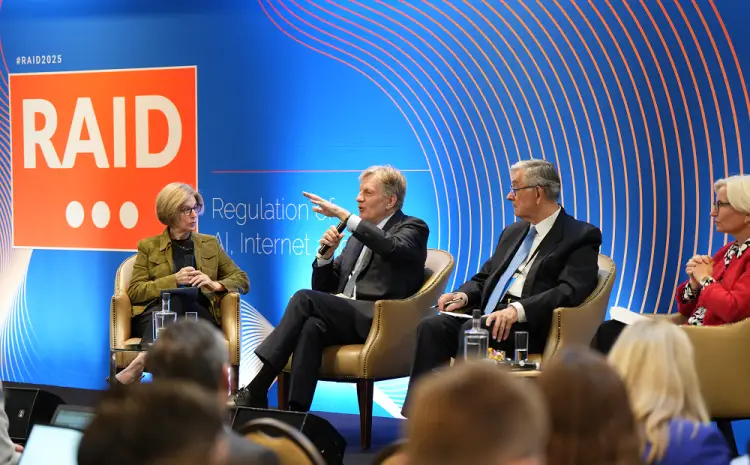RAID 2025 leads the charge for smart regulation of AI and digital tech

Esko Aho, Former Prime Minister of Finland at RAID 2025
The RAID (Regulation of AI, Internet & Data) 2025 conference brought together global leaders from government, industry, and academia to explore how regulation can balance innovation, competition, and fundamental rights in the digital age. Across a series of panels and keynotes, speakers examined competitiveness in AI, the need for alignment between regulatory frameworks, and whether the pace of new legislation risks stifling innovation.
Beyond the bubble
The challenges of growing Europe’s economies and industries were a common thread throughout the conference. In his opening keynote address, Esko Aho, Former Prime Minister, Republic of Finland said: “If you look at the AI achievements until now, the fact is that Americans and Chinese are well ahead. In the horizontal game, we are in much better position… Sector by sector, making plans how to take the maximum out of artificial intelligence, that is what we should do in Europe now.”
Gary Marcus, Emeritus Professor of Psychology and Neural Science at New York University addressed the limitations of large language models in his keynote Q&A. “The reality is we’re not going to get to artificial general intelligence until we develop other techniques. And so what may happen that really changes the nature of the game, and should change how Europe is involved in this, is that the economics fall apart. There’s a very large chance that we’re looking at a bubble here.”
Bringing the US perspective, Daniel Guarnera, Director of the Bureau of Competition, US Federal Trade Commission said: “We want to ensure that the future of AI is shaped by open markets and fair competition. That’s why we’re focused on enforcing the antitrust laws against actual conduct, not hypotheticals; on enforcement, not predictive rulemaking; on the inputs that make AI models possible in addition to the models themselves; and on ensuring that the rules of the road apply equally, whether you’re a startup building your first AI agent or a global platform deploying AI at scale.”
Alignment and balance
Opening the discussion on the balancing privacy and innovation, John Edwards, UK Information Commissioner, Information Commissioner’s Office said: “Events like RAID feel more important every year, because we’ve got to have these conversations on a very frequent cycle. They bring us together to discuss how opportunities can be realised and challenges confronted.”
Ahmed Baladi, Partner, Gibson Dunn said: “The protection of personal data should coexist with other fundamental rights. It’s not a question of giving up certain rights to apply or implement others. It’s equally important to ensure that the other fundament rights, such as freedom of expression, public safety, or the right conduct business, are also protected by lawmakers, regulators and industry.”
Access to technology
Another important message of the conference was the need to share the benefits of technology. On the opening panel on smart regulation, Kate Jones, CEO of the UK’s Digital Regulation Cooperation Forum said: “I came into regulation because I see it as the way that we are going to get things right, to enable everyone to take the benefits of AI and digital technologies, rather than just a few people, and to have a competitive environment that enables industries of all sizes.”
“We absolutely encourage not only the protection and security around AI development and deployment, but for us it’s so foundational to ensure that everyone has access to this critical technology,” said Nicole Isaac, Vice President of Global Public Policy, Cisco. “In a world where 2.6 billion individuals lack access to connectivity, and almost 75 million in Europe alone, we know that it is through this technology that we can unlock access to greater resources and greater opportunity.”
A regulatory maze
“We need to give credit to the EU for having this ambitious approach to creating this digital rulebook,” said Nicolas de Bouville, Privacy Policy Manager at Meta, before adding: “One of the major risks here is that this digital rulebook that was supposed to be a guiding compass for companies is already becoming a regulatory maze.”
Kilian Gross, Head of Unit AI Office, DG CNECT, European Commission put paid to speculation that implementation of the AI Act might be paused. “We don’t intend to stop the clock, to put the AI Act in the freezer and take it out again in a few years,” he said. “If you stop pedalling a bicycle, it falls.”
Addressing the dynamic nature of digital regulation, Camilla Bustani, Director, International, Ofcom, UK said: “The goalposts are always moving. We know the outcomes we want: we want a safer life online for users. What that means in practice will change as quickly as the technology changes, as quickly as the commercial models evolve.”
“A consistent theme that’s come up throughout the conference has been the extent of change that is coming for the digital platforms,” said Joanna Conway, Partner & Internet Regulation Lead, Deloitte. “Some of the clients we work for are facing a tidal wave of regulation across multiple jurisdictions. The important thing is prioritisation, consistency and putting in place a regulation-agnostic approach, so you can have an efficient way of complying at scale with regulations – and one that’s sophisticated and nimble enough to adapt as regulations evolve.”
With the European Commission set to simplify its regulatory agenda via the Digital Omnibus, with new regulations such as the Digital Fairness Act in the pipeline, and with uncertainty about with sustainability and impact of the generative AI boom, the discussions at RAID 2025 could not have been more timely.
RAID 2025 was delivered with the support of Platinum Sponsor Gibson Dunn; Gold Sponsors Deloitte and Meta; Silver Sponsors Amazon, Orrick and TikTok; and Industry Partner Cisco.




